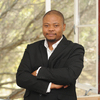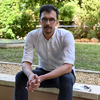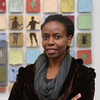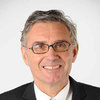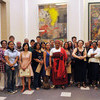‘Find your scholarly voice’ – new RLP cohort advised
18 May 2023 | Story Helen Swingler. Photos Lerato Maduna. Read time 10 min.
Eleven participants have been named in the 2023 cohort of the University of Cape Town’s (UCT) Research Leadership Programme (RLP), which targets mid-career women academics; the “missing middle”. The new group was introduced and welcomed at a function on upper campus on 11 May.
Deputy Vice-Chancellor for Research and Internationalisation Professor Sue Harrison hosted the event. Spread across UCT’s faculties, the RLP aims to grow the women scholars who will lead the university’s research in the future. The new cohort, larger than usual because of the excellence of nominations received, includes:
- Associate Professor Abonge Bangeni (Academic Development Programme)
- Associate Professor Sabirah Adams (Academic Development Programme, Language Development Group)
- Dr Kate Webb (paediatrics and child health)
- Professor Salome Maswime (global surgery)
- Associate Professor Fatima Osman (private law)
- Associate Professor Afton Titus (commercial law)
- Professor Hamieda Parker (UCT Graduate School of Business)
- Associate Professor Maria Keet (computer science)
- Associate Professor Sheetal Silal (statistical sciences)
- Associate Professor Malebogo Ngoepe (Centre for Research in Computational and Applied Mechanics)
- Associate Professor Tanja Bosch (film and media studies).

It was also an opportunity to say farewell to the 2022 cohort of 10 RLP fellows and to draw on their experiences. Six representatives of the group shared their reflections on the year-long programme, saying that coaching, mentoring, networking, and sharing were key elements of the support they had received.
In her welcome, executive director of research, Dr Linda Mtwisha, said the programme is one way of changing the face and profile of leadership in academia.
“There has never been a greater need, across all sectors of the economy.”
“We want to see more Linda-Gail Bekkers, Val Mizrahis, Stella Nkomos and other young scholars of their calibre.”
Dr Mtwisha said that while the national trend has been to invest in early-career and established academics, the focus here is on supporting the “missing middle” in the pipeline of developing highly prolific and esteemed women scholars.
“We have partnered with this group to support, help and accelerate them,” she added. “We want to see more Linda-Gail Bekkers, Val Mizrahis, Stella Nkomos and other young scholars of their calibre, each bringing their own ‘flavour’ to research.”

No script for development
Mtwisha’s last point was the core of guest speaker Professor Stella Nkomo’s address. A National Researcher Foundation A-rated researcher from the Department of Human Resource Management at the University of Pretoria, Professor Nkomo is internationally recognised for her research on gender and diversity in organisations.
“No one can give you a script.”
She congratulated UCT for investing in the RLP and giving young women researchers tools they need to become the researchers they strive to be.
“No one can give you a script,” said Nkomo, who held the floor with a punchy story of her journey as an ‘accidental academic’; how she rattled cages in white corporate America and rose to become an academic leader in her field.
Her first questions to the new cohort cut to the heart of leadership. “What do you want to lead? And, if you’re going to be a research leader, why would anybody want to be led by you?”
Nkomo didn’t have a plan to become an academic or an academic leader. One of 10 children growing up in America’s segregated south, Nkomo’s family later moved to New York City, where she grew up in the ‘projects’, or subsidised housing.
“I didn’t know anything about PhDs. We just thought doctors were medical doctors. Becoming a scholar and getting into this business of creating knowledge … it wasn’t part of my world.”
Finding your scholarly voice
Her first break was attending a desegregated school. But on the cusp of high school, the counsellor told her she could not attend college; her family was too poor, and she needed to get out and work.
She took commercial subjects instead: shorthand, typing and stenography. But after graduating top of her class, Nkomo didn’t get job interviews until she accompanied a white friend to an interview. Luck was with her. The firm, a large corporate bank, hired them both and Nkomo became the branch’s first black secretary.
One of her jobs was to show the newly minted Master of Business Administration (MBA) candidates around. They came to the branch for training. When Nkomo asked her boss how she could become one of them, he told her she’d need to go to college.
And she did. Four years of night classes secured her first degree in business. An MBA followed (she was one of three women and the only black woman in the class). But it wasn’t corporate America that became her home. Nkomo was recruited to lecture at a university. After a year, when she asked for her contract renewal, her far-sighted senior told her that if she wanted an academic career, she’d have to get a PhD.
“And so, I did.”
Nkomo wanted to study black managers in corporate America. She was told it wasn’t mainstream enough. That was an important lesson, Nkomo told the RLP cohort.
“When navigating a career, you must learn when to become instrumental and when not. What did I want? I wanted to change things. So, I picked a mainstream topic and when I look at my PhD now, I can’t believe I did that. It’s so far from who I became. [But] you don’t know where you’re going to end up. And you should be transforming constantly.”
Her second lesson for the RLP group was about developing a scholarly voice.
She had a PhD, but she didn’t feel like a scholar.
“I was doing formula work, thinking of article-like outputs to get my contract renewed. I was very narrowly focused.”
Find the tools
And when she found someone with similar research interests, they banded together to form a collaboration. It was a brave move into fresh territory. No one was researching black managers in corporate America.
Her head of department was dismayed. But she stuck to her guns and launched a survey. One day, a particularly thick reply envelope arrived from an interviewee. It included a three-page, single spaced handwritten letter from a black women manager, the only one in a large Texan oil firm, who poured out her experiences of racism and sexism in corporate America.
Nkomo still remembers the last sentence of the letter. It thanked her profusely for doing the research.
“No one had ever asked her what it was like to be a black woman in corporate America. It was an epiphany that I was doing research that really mattered. And I realised that qualitative methodology was going to allow me to understand what I really wanted to: What were their experiences? How do I make them visible?
“And that is when Stella found her scholarly voice.”
Academia is a calling
She added: “Scholarly voice is unique. It allows us to engage with the world, to share what we think. You find your scholarly voice when you become clear on ‘What am I curious about?’ That allows you to become a knowledge creator.
“Second, ask: ‘Why is it like this?’ And ‘What can be done about it?’ It’s about doing research that matters; it matters to you, and it matters to that black woman manager. Because there is no way you would stay in academia if you weren’t energised, motivated by your research.
“Third,” said Nkomo, “what is your epistemology for doing that work? What constitutes truth for you? For me it was discovering that I needed different tools; something that would allow me to go deep into understanding the lived experiences, of being ‘the other’ and understand from that person’s perspective.”
“One thing about being a research leader is constantly reinventing yourself.”
After she came to South Africa 23 years ago, Nkomo remained anchored in the field but knew she had to grow her theoretical framing of the problem to understand exclusion in this country.

“One thing about being a research leader is constantly reinventing yourself. There should be growth in your intellectual development.”
Also, help others climb.
“To be a research leader you must be at the frontier of scholarly conversation. You must be thinking: What are the next questions? Where’s the next evolution? Where should we be going?”
And the best people to do that are often the postgraduate researchers and the newer researchers coming in, she said.
And when her peers advised her to get a research chair, she opted instead to develop African Management Studies, forming the African Academy of Management to grow the discipline.
Streamline the process
In his closing remarks, Vice-Chancellor (interim) Emeritus Professor Daya Reddy, who has been part of this programme from its inception as a mentor, underscored UCT’s commitment to the programme.
“[We must] leverage the critical mass of women in academia, empowering women as they accumulate more responsibilities and the hurdles become more arduous.”
The RLP would help to streamline the pathways.
He also acknowledged the important part played by the programme’s mentors: senior colleagues who are “extremely committed” to programmes of this kind.
 This work is licensed under a Creative Commons Attribution-NoDerivatives 4.0 International License.
This work is licensed under a Creative Commons Attribution-NoDerivatives 4.0 International License.
Please view the republishing articles page for more information.
Centre for Higher Education Development
In the news


.jpg)



